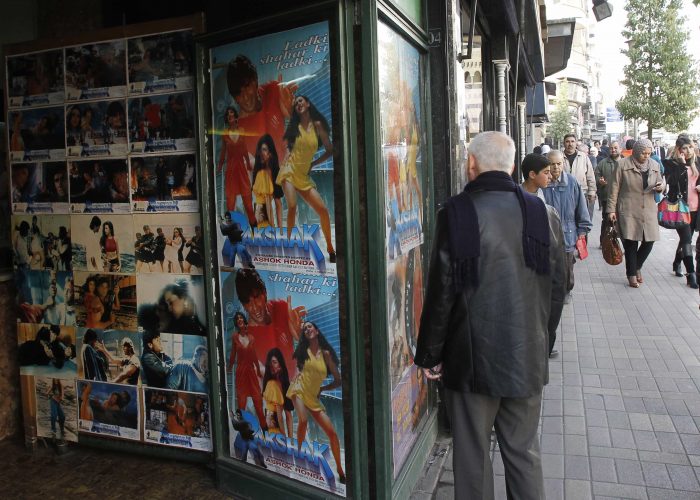New Players Challenge America’s Cultural Dominance
The United States has been the world’s cultural giant since the twentieth century—but is its supremacy and soft power being challenged by Bollywood, Dizi, and K-Pop?

A man looks at Bollywood movie posters at the entrance of a cinema in Damascus January 21, 2014. Reuters/Khaled al-Hariri
The United States was the cultural beacon of the last century; yet, the country’s status is declining in the face of new cultural movements in the East, Fatima Bhutto argues in her new book, “New Kings of the World: Dispatches from Bollywood, Dizi, and K-Pop.” In a lecture at the American University in Cairo’s (AUC) Oriental Hall on February 11, Bhutto reiterated her argument and identified key challenges to U.S. cultural influence.
Bhutto outlined three internal factors responsible for the United States’ cultural decline. First, she linked the spread of American culture in the latter half of the twentieth century to the presence of its troops abroad. “They brought their cultures with them, their films, their music, their tastes and their products,” Bhutto explained in an interview with the New York Times. U.S. troop deployment overseas, however, has decreased rapidly: In 2017, it was at its lowest since the 1950s, a statistic which Bhutto used in her lecture at AUC to argue that American culture isn’t spreading as quickly as it once did.
Bhutto used South Korea as a case study, which she said is the most potent example of the reach of the U.S. military industrial complex. Writing for the New York Times, E. Tammy Kim detailed “California-style mansions,” American ATMs, and a movie theater complete with Marvel films inside of Camp Humphreys, a U.S. army garrison in Pyeongtaek. But, “The privilege of being allowed to enter Camp Humphreys was not lost on me”, Kim wrote. “As a journalist and the family member of an Army veteran, I had access to thousands of acres that most Koreans will never see.”
Bhutto also tied American cultural decline to a loss in credibility, particularly under President Donald Trump. This loss of credibility combined with increasing global migration and urbanization means that the image of Old Hollywood glamour resonates with the non-Western public far less than it used to. Viewers no longer see themselves reflected in American popular culture, and are skeptical that they ever will.
They do see themselves reflected in Bollywood movies, Dizi television dramas, and K-Pop music, Butto counters. These industries—hailing from India, Turkey, and South Korea, respectively—are homegrown, and channel messages of nationalism to appeal to the non-Western viewer’s sense of self.
But, perhaps the reason why the popularity of Asian movements has grown among a population used to Western cultural products is because they embody many of the same values. Bhutto says that, in a way, “Asian popular culture is a mimicry” of America’s; many hit K-Pop songs are based on Western pop tempos, which are then “localized” (i.e., sped up) to turn them into something new. K-Pop producers also ensure that their songs include a smattering of English, so that everyone can sing along. Think about the 2012 hit “Gangnam Style,” Bhutto urged her (largely bilingual Arabic and English) audience: what three words do you know in that song?
Moreover, Asian and Western popular cultures have been able to compete because both spheres seek to internalize the values of morality and openness as they each understand them. “Both show states not as they are, but how they want to be,” Bhutto explained. The Turkish dramas Diriliş: Ertuğrul (Resurrection) and Payitaht: Abdülhamid (The Last Emperor), for example, are glamorous historical recounts of life under the Ottoman Empire. Their version of events is in sharp contrast to the Saudi TV show Mamaluk Al-Nar (Kingdoms of Fire), which was recently aired as an alternate view of the Ottomans in the face of its Dizi counterparts’ success.
The film “Modi,” released in 2019, presents a god-like view of India’s Prime Minister.
The use of popular culture as a vehicle of regional politics has also contributed to Asian movements’ success. States increasingly promote—or suppress—Bollywood, Dizi, and K-Pop products in line with their regional ambitions. The aforementioned Saudi-Turkish television battle is just one example; the cast of Ertuğrul was visited by Nicolas Maduro, the contested president of Venezuela. Joseph Stalin was a fan of Bollywood, which Bhutto says “set the mood music” for the rise of India’s neofascist right. Kim Jong-Un attended a South Korean K-Pop concert a week before meeting with President Moon Jae-in.
“[Art is] a Trojan horse,” Bhutto summarized.
Even the United States has promoted Asian popular culture in line with its political leanings. Netflix just announced that it has selected six Saudi short films to add to its repertoire at the end of February.
Yet, a question remains: has this promotion of Eastern popular culture had any negative effect on Western cultural industries?
Bhutto argues that there is a challenge to American popular culture specifically—namely television, film, and music. But, what is important is the way that popular culture plays into the broader concept of soft power: states’ abilities to “[get] other countries to want what it wants…in contrast with the hard or command power of ordering it to do what [they want],” as put by Joseph Nye. Although a state’s global influence in popular culture is certainly part of its soft power, it’s only a drop in the bucket.
Anmol Saxena of the BRICS Post wrote that, when America voted for President Donald Trump in 2016, it voted “for a global retreat.” First, the Trump administration withdrew from the Trans-Pacific Partnership; then the Paris Climate Agreement; then the Joint Comprehensive Plan of Action.
Certainly, to Trump’s supporters, isolationism is part of the appeal of his “America First” foreign policy. But, also inherent to his foreign policy—and to his profile as a candidate itself—is a sense of aggressive machismo. The popular culture that Bhutto discusses is charged by rhetoric, and Trump’s rhetoric of machismo has been echoed by right-wing figures across the globe—from Boris Johnson to Narendra Modi.
Also integral to soft power, according to Nye, are quality of health and education, employment opportunities, economic growth, technology, and transportation: factors that make individuals want to live in one state or another. It’s worth pointing out that Bhutto’s lecture was given in English, at the American University in Cairo, with refreshments catered by Crave, a Western-inspired Egyptian restaurant.
Threats surely have risen to U.S. soft power: but, the strongest ones aren’t from India, Turkey, or South Korea. 2019’s “Soft Power 30” report—written jointly by Portland consultancy group, the University of Southern California Center on Public Diplomacy, and Facebook, with contribution by Joseph Nye himself—ranked the United States fifth in terms of global soft power. It was beaten only by Western states: France, the United Kingdom, Germany, and Sweden.
Additionally, both the International Monetary Fund and the World Economic Forum agree that China is now the world’s largest economy, and that its education system is the largest in the world. China constitutes another threat to U.S. soft power, and one of its most potent challenges from the East. In 2019’s “Soft Power 30” Report, Japan, South Korea, Singapore, and China were the only Asian states to make the top 30, in that order. Ranked at eighth globally, Japan was the only one to break the top ten.
But, out of these Asian states, China was ranked the highest by the “Soft Power 30” in terms of culture. Bhutto closed her speech on this point, pointing out increasing usage of the Chinese media app TikTok within the United States. Social media “is the new frontier in the culture wars, and anyone who doesn’t realize it…is going to lose,” she emphasized.
Sydney Wise is contributing editor at the Cairo Review of Global Affairs. Her past work has been published at the Boston Consortium for Arab Region Studies. On Twitter: @sydneyywisee
Read More


